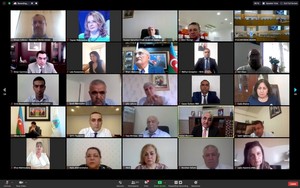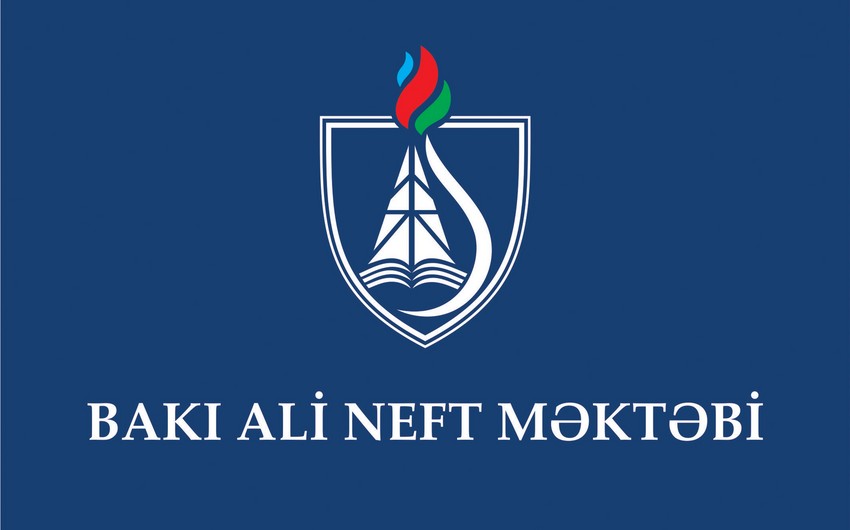Baku Higher Oil School (BHOS), together with the Istanbul Technical University (ITU) and Azerbaijan State University of Economics (UNEC), held a webinar on the topic "Online Education and Knowledge Assessment during the COVID 19 pandemic: Challenges and Opportunities".
Rectors of Baku Engineering University, Azerbaijan Technical University, Azerbaijan Pedagogical University, Azerbaijan Academy of Labor and Social Relations, Azerbaijan University of Tourism and Management, Mingachevir State University, Azerbaijan State University of Culture and Arts, senior executives of the Ministry of Education and authorized representatives of several higher education institutions took part in the webinar.
More than 200 people participated in the webinar organized on the ZOOM platform.
At the beginning of the event, the participants honored with a minute of silence the memory of soldiers and officers who had fallen by the death of brave as a result of provocation committed by Armenian armed forces in Tovuz district.
Rector of Baku Higher Oil School Elmar Gasimov, Rector of Istanbul Technical University Mehmet Karaca, Rector of Azerbaijan State University of Economics Adalat Muradov, Secretary-General of Black Sea Universities Network Eden Mamut delivered keynote speeches at the webinar.
Welcoming the participants of the event on behalf of its organizers, the BHOS Rector Elmar Gasimov said that he believes that the webinar will be useful in terms of finding solutions for problems existing in the field of distance and online education, as well as forwarding new proposals. He noted that diplomas or certificates issued to students upon completing distance learning courses are not yet recognized as documents confirming the high quality of education.
Therefore, Elmar Gasimov proposed that teachers and instructors continuously improve their knowledge and use new technologies and trends on time.
"Students want to get quality education from us. Therefore, such events and the exchange of views and experiences should be held from time to time. We must organize distance education at the highest possible level. Baku Higher Oil School ensured the continuity of the education process during the pandemic period due to the timely implementation of the distance learning system, including online lessons and exams. However, if the current situation continues for an indefinite time, we will have to provide a more orderly transition to distance education from the new academic year," the rector said.
In his speech, Rector of Azerbaijan State University of Economics Adalat Muradov noted that the pandemic period gave new rights to distance education. He said that work on distance education began in the UNEC in 2016, and preparatory work was carried out for two years. During this period, a distance education center was created, providing distance learning to 20,000 students.
"The center, which was commissioned in 2018, created a wide range of technological opportunities for the university."
Adalat Muradov also noted that all universities currently operating in Azerbaijan are being faced with unfounded myths about distance education, such as "distance learning does not provide high-quality education", "distance education has never been implemented in Azerbaijan," "scientific-research institutions have not conducted research in this area," "there are no teachers to conduct distance education".
"However, thanks to the timely acquisition of technological knowledge by teachers in Azerbaijan, the possibility of arising problems associated with distance education was eliminated. I would say that distance education erases the boundaries between universities. The disadvantage of distance education is its inability to perform the function of socialization. There are also non-online forms of distance learning. But we did not think about it, and this creates serious problems for us. Thus, it is impossible to admit to international university students from countries located in different time zones. Distance education eliminates the boundaries between universities, and students have the opportunity to listen to lessons broadcast online from other universities. But what will happen if students start leaving local universities on a mass scale? This is the main question," Adalat Muradov said.
The UNEC Rector noted that distance education is expensive education that entails applying the latest technologies and the new updating of technologies and software. He also stated that it is necessary to create virtual laboratories and textbooks on distance education and conduct regular training for teachers in this area, requiring investment. Adalat Muradov said universities often do not have such an opportunity.
Rector of Istanbul Technical University Mehmet Karaca said that the pandemic changed the world as a whole. According to him, many universities across the globe intend to continue training online.
"Leading universities, such as Boston, Harvard, and Cambridge, decided to continue online training until the end of this year and even early next year. In the worst case, we will remain online training in Turkey until the end of this year. I would like to note that some areas will enter the forefront in online education, and some will go to the background. There is a radical opinion that parents can start thinking that their children do not need to study for four years and that it will be better for their children to become business owners having only certificates.
Mehmet Karaca recalled that the ITU, which has a 150-years-old history, began using the distance education system five years ago.
"With the creation of the Ninova Education Center, a transition to synchronous training began, and on April 6, the university began to conduct distance and online training. During this time, 26 million students attended classes, and 1,5 million minutes of synchronous training were provided."
The ITU rector noted that reexaminations were organized for students who had problems connecting to the Internet.
"Besides, the summer school period was reduced to 5 weeks, and the number of credits was also reduced."
Secretary-General of Black Sea Universities Network Eden Mamut said that the organization he heads unites 120 universities.
"Among the members of the Network, there are universities from the European Union and the Eurasian Region."
Eden Mamut believes that the Black Sea Universities Network can play the role of a bridge in distance education in this context.
"During the pandemic, many such conferences were held on distance education. I would like to draw your attention to the fact that professors from America and Europe also raise the problems mentioned here today. Even though there are many technologically developed countries globally, no university is completely ready for the transition to distance education. This is because no one knows where this hybrid system began and where it goes. Therefore, when we are using technologies, we must think about new forms."
The Secretary-General proposed creating a Black Sea Regional Master's Program for the necessary spheres and specialties. The ITU Vice-Rector for Academic Affairs Fuat Aydin, the ITU Vice-Rector for Science and Research Alper Unal, Director of the Center for Information Technology Kuneit Tantu, made presentations at the webinar.
The webinar concluded with a Q & A session.



 https://static.report.az/photo/a68c0263-03a8-4136-bcda-32f2fa3d700a.jpg
https://static.report.az/photo/a68c0263-03a8-4136-bcda-32f2fa3d700a.jpg

